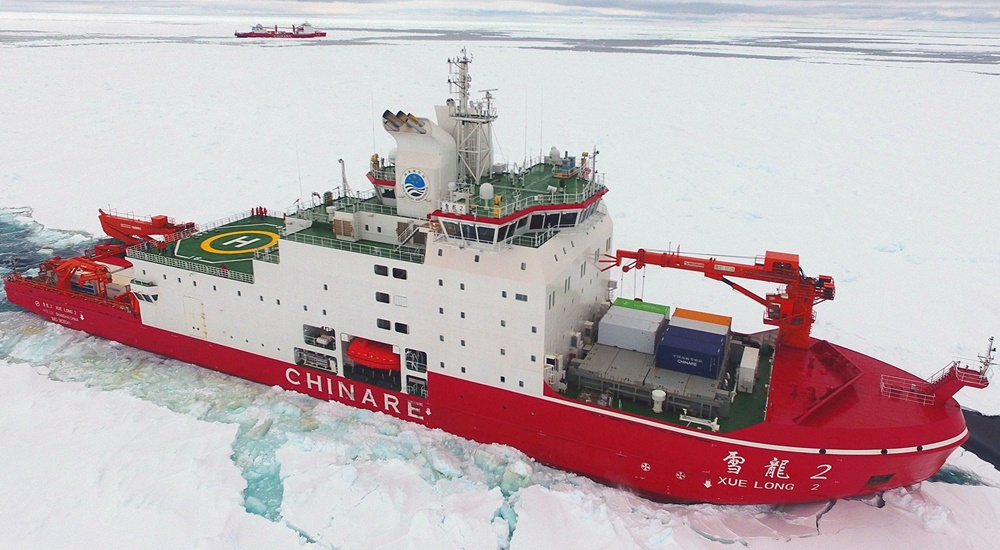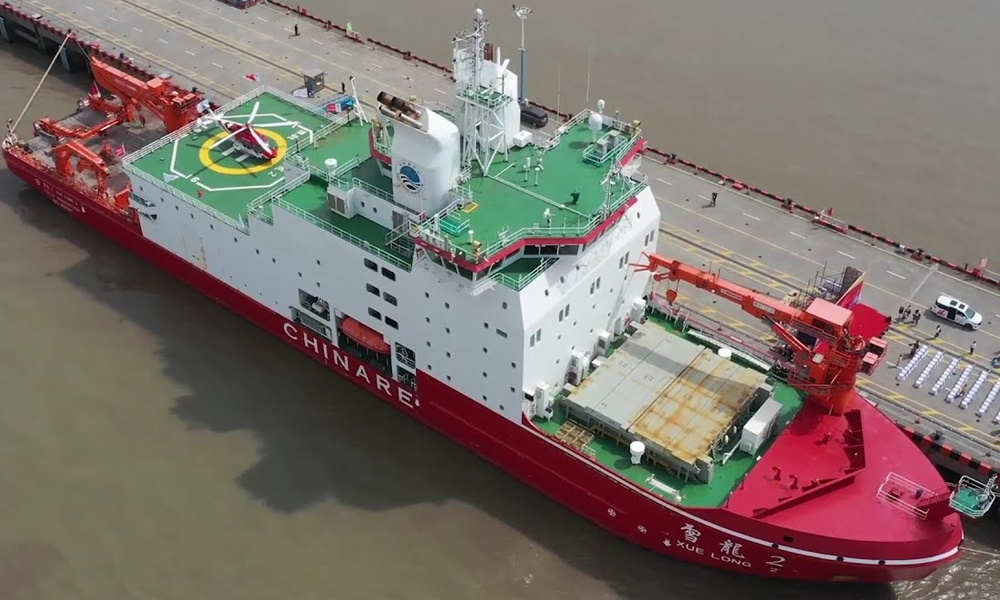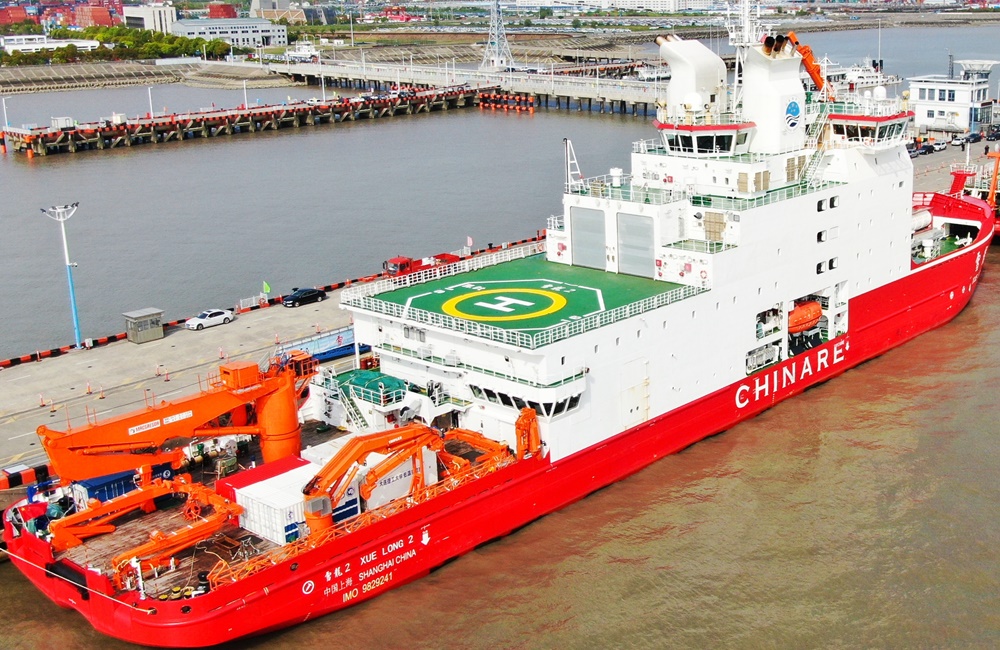Xue Long 2 icebreaker
Former names : Xuelong 2, Snow Dragon 2
Xue Long 2 icebreaker current position
The current location of Xue Long 2 icebreaker is in Southern Ocean cruising en route to AST SEA. The AIS position was last reported 54 minutes ago.
Current PositionSpecifications of Xue Long 2 icebreaker
| Year of build | 2019 / Age: 7 |
| Flag state | China |
| Builder | Jiangnan Shipyard (Shanghai, China) |
| Class | PC3 diesel icebreaker |
| Ferry route / homeports | Shanghai |
| Engines (power) | Wartsila (20.6 MW / 27625 hp) |
| Propulsion power | 15 MW / 20115 hp |
| Speed | 15 kn / 28 km/h / 17 mph |
| Length (LOA) | 122 m / 400 ft |
| Beam (width) | 22 m / 72 ft |
| Gross Tonnage | 12769 gt |
| Passengers | 60 |
| Crew | 30 |
| Decks | 8 |
| Decks with cabins | 2 |
| Former names | Xuelong 2, Snow Dragon 2 |
| Owner | Polar Research Institute China |
Xue Long 2 icebreaker Review
Review of Xue Long 2 icebreaker
The 2019-built RSV Xue Long 2 icebreaker (aka Xuelong 2, translated "Snow Dragon 2") is China's newest icebreaking vessel that follows China's first icebreaker - Xue Long (1993-built). "RSV" stands for "research and supply vessel". The ship is owned by China's Polar Research Institute/PRI which currently manages 5x Chinese polar research stations (4x Antarctic, 1x Arctic), as well as both icebreakers (Xue Long 1, Xue Long 2).
The vessel (IMO number 9829241) is China-flagged (MMSI 413381260) and homeported and registered in Shanghai.

The shipowner/Polar Research Institute China-managed polar bases include Great Wall Station (1985-founded on King George Island Antarctica), Zhongshan Station (1989-founded on Larsemann Hills, Prydz Bay/Antarctica), Kunlun Station (2009-founded on Dome Argus, King Haakon VII Plateau/Antarctica), Taishan Station (2014-founded on Princess Elizabeth Land/Antarctica) and Yellow River Station (2004-founded in Ny-Alesund, Spitsbergen Island, Svalbard Norway/Arctic).
Xue Long 2 vessel (construction, history, specs)
The icebreaking vessel is "Polar Class 3"/PC3 (with the same ice-class are the icebreakers Kronprins Haakon and Nuyina), design draft 7,9 m (26 ft), max draft/at full load 8,3 m (27 ft), displacement tonnage 14300 tonnes, depth 11,8 m (39 ft).
The powerplant is based on all four Wartsila marine diesel engines/electricity generators (two model 12V32/12-cylinder/total 19,6 MW, and two model 8L32/8-cylinder, total 1 MW) with combined power output 20,6 MW. The propulsion system is diesel-electric, based on two "Azipod 6" units (ABB bow thrusters, each 7,5 MW, or combined output 15 MW). Along with the Azipods, ABB also supplied A100-M turbochargers (designed for medium-speed marine engines) to enhance the engine's load response.
Xue Long 2 can navigate at max-speed 15 knots (28 kph / 17 mph) in open water (with 2 engines running) and has icebreaking capacity 1,5 m (5 ft) at speed 3 knots (6 kph / 3,5 mph), range 20000 NM (37000 km / 23000 mi), lowest operational temperature -45C (-49F). The economic speed is 12 knots (22 kph / 14 mph).
The hull design allows two-way icebreaking - while moving both forward and backward/astern.
The ship provides accommodation (2-bed and 4-bed cabins) for a total of 90 people (~30 crew plus ~60 mission personnel and scientists).

Signature features are the Helideck (aft-positioned helicopter-landing platform), hangar (for 2x aircraft), and Cargo Hold (fore-located storage for bulk cargoes, served by a heavy crane), two large-capacity lifeboats (positioned portside and starboard). Onboard scientific equipment includes laboratories (wet labs and dry labs), Seminar Room (capacity 80 seats), Scientific Control Room, underwater/hull bottom-mounted instruments, Working Deck (aft, fitted with A-Frame, several cranes and winches), Moon Pool (midship, for diving support and deployment of instruments), USBL (ultra-short baseline tracking system), 12x total underwater equipment, including 2x ADCP (acoustic doppler current profilers), 2x EA600 (single-beam hydrographic echo sounders), 2x Wartsila ELAC Nautik SeaBeam (deepwater multibeam system), 2x Kongsberg EM710 (multibeam echo sounders), 4x Kongsberg Simrad EK60 (scientific echo sounders). Radio communications are facilitated by two satellite dishes (L/S, K/U) and one AWS antenna (Amazon Web Services).
In 2012, for EUR 5 million was contracted Aker Arctic Technology Oy (2004-founded Finnish engineering company) to design the vessel. The hull model was ice-tested at Aker Arctic's facility in Helsinki Finland. However, the design project was largely developed by the Shanghai-based MARIC (Marine Design and Research Institute of China (1950-founded).
For developing the technical solutions (including deck handling equipment), in 2011 was contracted MacGregor (specializing in engineering solutions) which is part/subsidiary of Cargotec Corporation/Cargotec Oyj (2005-founded Finnish company specializing in cargo-handling machinery for ships, ports, terminals).
MacGregor provided the ship's 3x offshore cranes, Working Deck's handling systems (research equipment and machinery), oceanographic winches) and Cargo Hold's hatch covers, as well as spare parts and service support.
Construction works on the newbuild started in December 2016, at China State Shipbuilding Corporation's/CSSC's Jiangnan Shipyard.
The vessel (yard/hull number H2650) was launched/floated out from drydock on September 10, 2018, and delivered and commissioned on July 11, 2019. Sea trials were conducted in May-June 2019. Later the ship departed from Shanghai en route to Antarctica (via Hobart Tasmania Australia). The 3,5-hour icebreaking sea trials in Antarctica (near Zhongshan Station) were successfully conducted on November 26, 2019.

The ship's Maiden Voyage was part of China's 36th Antarctic Expedition for transporting supplies (fuel and provisions) to the Great Wall Station and loading the base's waste (for disposal in China). XueLong 2 returned to Shanghai on April 23rd. This was China's first polar expedition with the two icebreakers traveling in tandem - Xuelong 1 and Xuelong 2. During the 198-day voyage, both vessels covered a distance of 70000+ NM (~130000 km / 80500 mi) and carried a total of 413 personnel (support staff, scientists, researchers).


